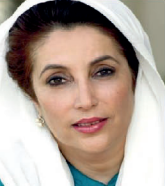
Benazir First Regime
Benazir Bhutto’s first term as Prime Minister of Pakistan, from 1988 to 1990, marked a historic moment in the nation’s political landscape. It was a period of great significance as she became the first woman to lead a Muslim-majority country. This article explores the key events, challenges, and achievements of Benazir Bhutto’s inaugural regime.
The Political Transition
Benazir Bhutto, the charismatic and educated daughter of former Prime Minister Zulfikar Ali Bhutto, came to power following the general elections held in November 1988. Her Pakistan People’s Party (PPP) secured the largest number of seats in the National Assembly, and she was sworn in as the Prime Minister, breaking new ground for women in politics in Pakistan and the broader Muslim world.
Challenges of Governance
Benazir Bhutto’s government inherited a challenging set of circumstances. Pakistan was grappling with a stagnant economy, political instability, and the legacy of a decade under General Zia-ul-Haq’s military rule. Addressing these issues required not only strong leadership but also navigating the complexities of Pakistan’s political landscape.
Economic Reforms and Social Initiatives
One of the notable achievements of Benazir Bhutto’s first regime was her commitment to economic reforms and social initiatives. Her government pursued policies aimed at reviving the economy, including efforts to privatize state-owned enterprises, attract foreign investment, and reduce government control over key sectors. These reforms were viewed as crucial steps towards economic liberalization.
In addition to economic reforms, Benazir Bhutto also championed social initiatives. Her government introduced measures to improve education, healthcare, and women’s rights. This included efforts to increase female participation in the workforce and promote gender equality in a traditionally conservative society.
Foreign Policy and International Relations
Benazir Bhutto’s foreign policy was marked by a pragmatic approach to international relations. Her government sought to improve relations with neighboring countries and strengthen Pakistan’s position on the global stage. This period witnessed efforts to enhance ties with India, address the Afghan conflict, and maintain a balance between Pakistan’s alliances with the United States and China.
Challenges and Opposition
Despite her accomplishments, Benazir Bhutto’s first term was not without challenges. She faced opposition from various quarters, including political rivals and powerful elements within the military establishment. Her efforts to assert civilian control over the military and address corruption within the government faced resistance.
Dismissal and Political Turmoil
In August 1990, President Ghulam Ishaq Khan, with the support of the military, dismissed Benazir Bhutto’s government, citing allegations of corruption and mismanagement. This marked the end of her first term as Prime Minister, and she would return to power in a subsequent election in 1993.
Conclusion
Benazir Bhutto’s first regime from 1988 to 1990 was a pioneering period in Pakistani politics. Her leadership as the first woman Prime Minister of Pakistan was a historic milestone, and her government’s policies aimed at economic reform, social development, and improved international relations left a lasting impact on the country. Although her first term was marked by challenges, it set the stage for her return to power in 1993 and her continued influence on Pakistan’s political landscape. Benazir Bhutto’s legacy as a trailblazer in Pakistani politics endures, inspiring future generations of women leaders in the country.

